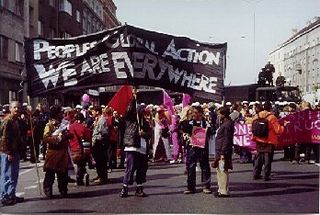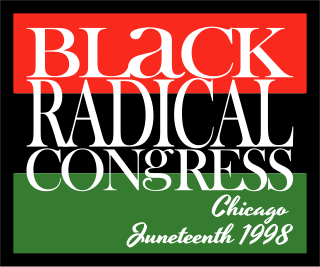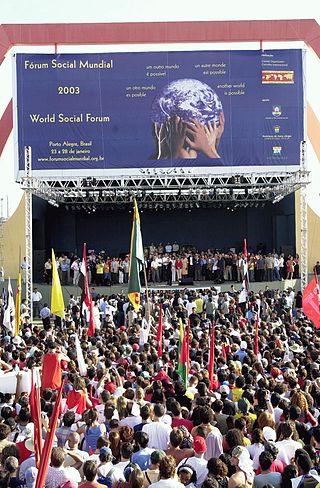
Peoples' Global Action (PGA) was the name of a worldwide co-ordination of radical social movements, grassroots campaigns and direct actions in resistance to capitalism and for social and environmental justice. PGA was part of the anti-globalization movement.

James Morris Lawson Jr. is an American activist and university professor. He was a leading theoretician and tactician of nonviolence within the Civil Rights Movement. During the 1960s, he served as a mentor to the Nashville Student Movement and the Student Nonviolent Coordinating Committee. He was expelled from Vanderbilt University for his civil rights activism in 1960, and later served as a pastor in Los Angeles for 25 years.

Community organizing is a process where people who live in proximity to each other or share some common problem come together into an organization that acts in their shared self-interest.

The Zabalaza Anarchist Communist Front, formerly known as the Zabalaza Anarchist Communist Federation (ZabFed), is a platformist–especifista anarchist political organisation in South Africa, based primarily in Johannesburg. The word zabalaza means "struggle" or "active rebellion" in isiZulu, isiXhosa, siSwati and isiNdebele. Initially, as ZabFed, it was a federation of pre-existing collectives, mainly in Soweto and Johannesburg. It is now a unitary organisation based on individual applications for membership, describing itself as a "federation of individuals". Historically the majority of members have been people of colour. Initially the ZACF had sections in both South Africa and Swaziland. The two sections were split in 2007, but the Swazi group faltered in 2008. Currently the ZACF also recruits in Zimbabwe. Members have experienced oppression in South Africa and Swaziland.
The Boston Social Forum was the first North American social forum to use the methodology of the World Social Forum process and adhere closely to its Charter of Principles. It was held at the University of Massachusetts Boston in Boston, Massachusetts in the United States from July 23-25, 2004, and coordinated by the Boston-based labor-community network, the Campaign on Contingent Work. CCW executive director Jason Pramas was the lead organizer of the forum.
The Institute for Social Ecology (ISE) is an educational institution in Plainfield, Vermont dedicated to the study of social ecology, "an interdisciplinary field drawing on philosophy, political and social theory, anthropology, history, economics, the natural sciences, and feminism." Founded in 1974, ISE offered some of the first courses in the country on urbanism and ecology, radical technology, ecology and feminism, activist art and community; it "won an international reputation" for its courses in social theory, eco-philosophy and alternative technologies.
The Alston/Bannerman Fellowship Program, based in Baltimore, Maryland, is committed to advancing progressive social change by helping to sustain long-time activists of color. The program honors those who have devoted their lives to helping their communities organize for racial, social, economic and environmental justice. The program provides resources for organizers to take sabbaticals for reflection and renewal. Since 1988, there have been 171 Fellows. They've worked on a broad range of issues from environmental justice to fair wages, from immigrant rights to native sovereignty, from political empowerment to economic revitalization. They are from 32 states, the District of Columbia, Puerto Rico and Guam.
TransAfrica is an advocacy organization in Washington, D.C. that seeks to influence the foreign policy of the United States concerning African and Caribbean countries and all African diaspora groups. They are a research, education, and advocacy center for activism focusing on social, economic and political conditions in Africa, the Caribbean, and Latin America and other parts of the African Diaspora. They are the largest and oldest social justice organization in the United States that focuses on the African world. They have served as a major research, educational, and organizing institution for the African and African Descendant communities and the U.S. public in general.
The United States Social Forum is an ongoing series of gatherings of social justice activists in the United States which grew out of the World Social Forum process, bringing together activists, organizers, people of color, working people, poor people, and indigenous people from across the United States. Its purpose is to build unity around common goals of social justice, build ties between organizations at the event, and help build a broader social justice movement. Planning for the first event was spearheaded by the organization Project South: Institute for the Elimination of Poverty and Genocide, and involved dozens of other organizations around the United States. The Forum defines itself as "a movement-building process. It is not a conference but it is a space to come up with the peoples’ solutions to the economic and ecological crisis. The USSF is the next most important step in our struggle to build a powerful multi-racial, multi-sectoral, inter-generational, diverse, inclusive, internationalist movement that transforms this country and changes history."

The Black Radical Congress (BRC) is an organization founded in 1998 in Chicago. It is a grassroots network of individuals and organizations of African descent focused on advocating for broad progressive social justice, racial equality and economic justice goals within the United States.
A social forum is an open meeting place for civil society organizations and individuals opposed to neoliberalism and what its participants regard as the domination of the world by capital and imperialism. The first social forum was the World Social Forum (WSF) held in January 2001 in Porto Alegre. It was designed as a counter forum to the World Economic Forum (WEF) held in Davos at the same time. While the WSF regards the WEF as a meeting of the political and economic elite of the world, the WSF gathers social forces and aims to promotes democratization and social justice.
Gustavo Marín, a Chilean-French economist and sociologist, is noted in particular for his key role in the creation and development of the longstanding international network, the Alliance for a Responsible, Plural and United World. He was Director of the world-governance think tank, the Forum for a new World Governance (FnWG) from 2007 to 2015. He is currently retired.
Fahamu is a not-for-profit organization supporting organizations and social movements championing progressive social change and human rights. With branches in the United Kingdom, South Africa, Senegal, and Kenya, Fahamu primarily engages with civil and human rights organizations through Pambazuka News, an online platform focusing on social justice. Additionally, they offer online courses on human rights and social justice and employ new technologies, including SMS, for information dissemination, lobbying, and interactions.

The Global Greens (GG) is an international network of political parties and movements which work to implement the Global Greens Charter. It consists of various national green political parties, partner networks, and other organizations associated with green politics.

May First Movement Technology formerly known as May First/People Link (MF/PL) is a non-profit membership organization that uses mutual aid to provide Internet services, such as web hosting to progressive organizations and individuals. Founded in 1995 and based in New York City, MF/PL is one of the Internet's oldest progressive organizations. A member of Association for Progressive Communications, MF/PL directors, leaders, and members agree upon principles of progressive use of technology, outlined by a Statement of Unity.
Transformative social change is a philosophical, practical and strategic process to affect revolutionary change within society, i.e., social transformation. It is effectively a systems approach applied to broad-based social change and social justice efforts to catalyze sociocultural, socioeconomic and political revolution. In seeking to integrate and then politicize personal development and social development as an overarching approach to social change at multiple levels, addressing a wide range of issues, using holistic, nonviolent methods, it may be best classified as a new social movement. Rather than focus on particular issue(s), it seeks to impact the culture of left of center social movement and organizing work. However, by considering the dismantling of and liberation from oppressive systems, including economic, as core to its goal, it defies even definitions put forth for new social movements. As a comprehensive approach to progressive social change, it distinguishes itself from the "ordinary" change of conventional social change, social justice, and their respective organizing practices by placing emphasis on personal, organizational and social systemic change that cannot be undone, or "deep change".

The World Social Forum is an annual meeting of civil society organizations, first held in Brazil, which offers a self-conscious effort to develop an alternative future through the championing of counter-hegemonic globalization.

Alter-globalization is a social movement whose proponents support global cooperation and interaction, but oppose what they describe as the negative effects of economic globalization, considering it to often work to the detriment of, or to not adequately promote, human values such as environmental and climate protection, economic justice, labor protection, protection of indigenous cultures, peace and civil liberties. The movement is related to the global justice movement.

The anti-globalization movement, or counter-globalization movement, is a social movement critical of economic globalization. The movement is also commonly referred to as the global justice movement, alter-globalization movement, anti-globalist movement, anti-corporate globalization movement, or movement against neoliberal globalization. There are many definitions of anti-globalization.
Project South: Institute for the Elimination of Poverty and Genocide is a non-profit organization based in Atlanta, Georgia that incorporates sociological research into education and organizing projects. Project South focuses on developing activist strategies in response to social issues in the Southern region of the United States. The organization was founded in 1986 by Jerome Scott and Walda Katz-Fishman.